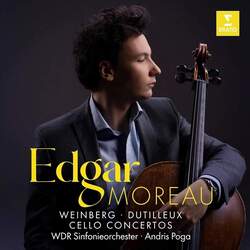Das Spiel des Cellisten Edgar Moreau fällt immer wieder durch Gestaltungssicherheit, Musikalität und eine überzeugende Klangqualität auf. Das ist auch in der Einspielung mit den Konzerten von Dutilleux und Weinberg wieder zu erleben. Es ist kein Wagnis, aber die Zusammenstellung der beiden Werke ist außergewöhnlich. In beiden Stücken steht eine poetisch lyrische Aussage im Vordergrund, weniger das Virtuose. Dennoch erfordern beide auch vom Solisten, seiner technischen Fähigkeiten sicher zu sein. Auch damit hat Moreau kein Problem.
In diesem Fall kommen weitere Ebenen hinzu. So wie Weinbergs Konzert im Umfeld von Sowjetregime und der Freundschaft zu Shostakovich gehört werden muss, so ist bei dem Werk von Dutilleux mit Charles Baudelaire als größte künstlerische Inspiration des Komponisten einzubeziehen, stellt er doch jedem der fünf Sätze ist ein Baudelaire-Epigraph voran, um eine musikalische Analogie für ein poetisches Bild zu komponieren.
Moreau formuliert die Solostimmen mit einem ausgeprägten Sinn für die feinen Nuancen und erzählerischen Details der Musik. Mit großer, aber nicht entgleisender Empfindung zeichnet er ebenso zart-lyrisch wie er auch expressiv mit ausgeprägter Energie agiert, je nachdem, welchen Part er gerade umsetzt.
Das WDR Sinfonieorchester mit Dirigent Andris Poga bietet dazu eine eminent klar gestaltete orchestrale Umgebung, die ebenfalls klangsensibel wie auch fast schon karikaturistisch in manchem Bläsereinwurf die prägenden Elemente der Partituren modelliert.
The playing of the cellist Edgar Moreau always stands out for its creative confidence, musicality and a convincing sound quality. This can be experienced again in this recording with the concertos by Dutilleux and Weinberg. It is no venture, but the combination of the two works is extraordinary. In both pieces, the emphasis is on a poetically lyrical statement, rather than the virtuosic. Nevertheless, both also require the soloist to be confident of his technical abilities. Moreau has no problem with that either.
In this case, other levels are added. Just as Weinberg’s concerto must be heard in the context of the Soviet regime and his friendship with Shostakovich, so in the case of Dutilleux’s work Charles Baudelaire must be included as the composer’s greatest artistic inspiration, for he prefaces each of the five movements with a Baudelaire epigraph in order to compose a musical analogy for a poetic image.
Moreau formulates the solo parts with a keen sense of the music’s subtle nuances and narrative details. With great but not derailing sensitivity, he draws as delicately lyrical as he does expressive with pronounced energy, depending on which part he is realizing at the time.
The WDR Sinfonieorchester with conductor Andris Poga offers an eminently clearly designed orchestral environment, which likewise models the formative elements of the scores with sound sensitivity as well as almost cartoonishly in some wind interjections.


















